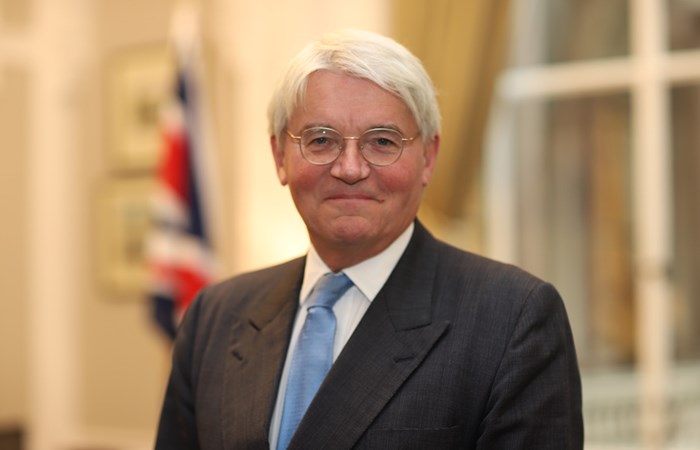Wilton Park

Good morning.
I am sorry not to be able to join you at Wilton Park, where I trust there have been lots of lively discussions over the last few days. However, I do want to thank you all for coming to be a part of this important conversation. I extend particular thanks to our friends at the World Bank for their support for this event. Also to UNHCR (United Nations High Commissioner for Refugees), and to those who have travelled considerable distances to join us.
It is fitting that this, the year of the second UN Global Refugee Forum (GRF), also marks the halfway moment of the Sustainable Development Goals a moment when we are all thinking more than ever about what it truly means to leave no one behind. It is this spirit which animates so much of the global effort to support those who have been forced to flee their homes.
This support to refugees would not be possible without the work of our partners at UNHCR, or the generosity and dedication of those countries hosting large refugee populations. We are very pleased to have some of these states represented at this conference, and I commend them for their efforts.
However, we are all too aware that the challenge of meeting even basic needs for forcibly displaced people is getting harder. The trends are against us, with total displacement climbing in 2022 to over 108 million people, including nearly 40 million refugees. These are truly sobering figures, but there are things we can do.
First, we can work together across sectors and geographies to tackle the root causes of displacement.
From Sudan to Ukraine, weve seen in the last year alone the extent to which armed conflict and violence drive displacement. Alongside other members of the international community, the UK has been proud to provide emergency humanitarian assistance in these contexts and around the world. But we must all redouble our efforts to support and sustain peace, in order to enable the safe return of refugees to their homes.
I am also aware that I am speaking when climate migration and displacement is no longer a hypothetical, but a reality. We cannot afford to ignore accelerating climate impacts such as drought and environmental degradation. And as the threat of climate change increases globally, the number having to leave their homes will continue to grow.
And yet, there are reasons for hope. From the Bridgetown agenda to COP (Conference of the Parties), the world is coming together to address this existential threat and protect the most vulnerable from its impacts.
It is all of our responsibility to make sure that forcibly displaced people are included in this conversation. This includes using all the possibilities afforded by international fora, such as COP28, to ensure that we are not working in silos.
The UK is acting to mobilise climate funding that will address the underlying climate-related drivers of humanitarian crises. This will increase the supply of, and access to, the climate finance that vulnerable countries need. We are, in fact, very pleased to be hosting an event at Wilton Park, on the subject next week.
Secondly, we can put those who bear the brunt of displacement at the centre of our approach to solutions. The UK is proud to champion the rights of women and girls around the world.
A core principle of this is ensuring access to 12 years of quality education. Education for displaced girls in emergencies or conflict settings is a powerful tool. It is one of the best mechanisms for protecting them from gender-based violence and it gives them the tools to rebuild their home communities when they are able to return. It can maximise the potential of educated populations for addressing the climate crisis, and for promoting peace and tolerance.
But this is about hosting countries, as well as refugees. We know that delivering this education through national systems will also benefit host community children, as investment in their education systems makes these systems more resilient, and more sustainable. This will ensure that strong education provision is left behind when refugees can return home. As a proud champion of girls education, the UK is excited to be driving forwards an education multi-stakeholder pledge at this years GRF.
Thirdly, we can help refugees contribute to their host communities. By supporting refugees freedom of movement and right to work, we enable their agency. And, in the words of the Global Compact on Refugees, we enhance their self-reliance.
These mutually reinforcing benefits cannot be realised without both the right policy environment, and a strong enabling environment made possible through development. Including refugees in national systems and national planning is central to this.
We all recognise the potential of the GRF to be a moment that galvanises meaningful change. That transforms the lives of both forcibly displaced people and their host communities. To fulfil these ambitions, how we use the next 6 months is vitally important.
In my recent speech at Chatham House, I launched the UKs new development platform, UKDev, which at its heart is about partnerships: partnerships with donor countries, partnerships with recipient countries, and partnerships across the sector. We must harness a wide range of actors to engage in the GRF. We must be clear in our intent, consistent in our approach, and strategic about our priorities. Above all, we must work together.
I look forward to hearing the results of your discussions and to working together over the coming months to realise our common ambitions for the GRF.
Thank you very much.
Find out more about the Wilton Park Towards the Global Refugee Forum 2023.
